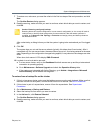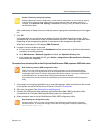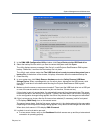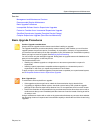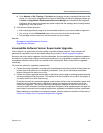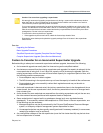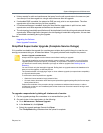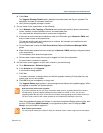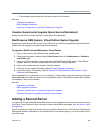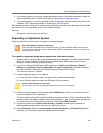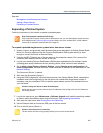
System Management and Maintenance
Polycom, Inc. 396
b Go to Network > Site Topology > Territories and reassign territory responsibilities back to this
cluster. Or, if previously integrated with a Polycom RealPresence Resource Manager system, go
to Admin > Integrations > RealPresence Resource Manager and reestablish the integration.
Integration with a resource management system imports the site topology data, including territory
assignments, from that system.
9 Call Polycom Global Services if:
After waiting significantly longer than the estimated install time, you’re still unable to log back in.
You can log in, but the Dashboard shows only one server for a two-server cluster.
The package version numbers on the two servers are not the same.
See also:
Management and Maintenance Overview
Upgrading the Software
Incompatible Software Version Supercluster Upgrades
All the clusters in a supercluster must be running compatible software versions. Patch releases will
generally be compatible, and can be installed using the procedure in Basic Upgrade Procedures.
But major and minor version upgrades will not be compatible. An incompatible version software upgrade on
all clusters in a supercluster requires careful planning because it’s not possible to upgrade a cluster to an
incompatible software version while it’s a member of the supercluster. Each cluster must be upgraded
individually.
You have two options for upgrading a supercluster:
● Perform the cluster upgrades in a system-wide maintenance window during which all the clusters can
be shut down and the service is completely unavailable. This is by far the simplest and fastest
method, taking as little as an hour or two.
● Perform the cluster upgrades incrementally so that some system capacity (although greatly reduced)
remains available during the process. This method is far more complex, error-prone, and lengthy. It
can easily take five or more times as long.
During the course of an incremental upgrade, some clusters will be on the new software version while
others are still on the older version, effectively creating two separate superclusters until all the
clusters are upgraded. This requires significant configuration changes in order for some level of
service to remain available, and those configuration changes must be repeated again and again as
each cluster is removed from the original supercluster, upgraded, and added to the new supercluster.
Before deciding to undertake an incremental upgrade, carefully read and consider the information in
Factors to Consider for an Incremental Supercluster Upgrade.



